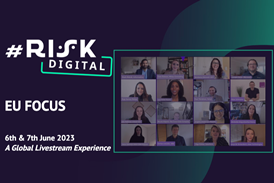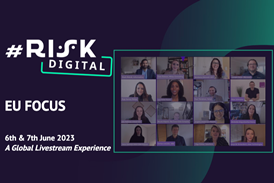We are delighted to confirm that AI Strategy Consultant, Dr. Ofer Hermoni will speak at #RISK A.I. Digital, this week.

Livestreaming March 20 and 21, #RISK A.I. Digital examines how we can harness AI technologies responsibly, ethically and safely.
Across two days, thought leaders, industry experts and senior professionals will provide their insight, enabling audiences to understand how to mitigate risk, comply with regulations and achieve robust governance over AI.
Event speaker, Dr. Ofer Hermoni is co-founder and former elected chair of Linux Foundation AI & Data. He is a respected entrepreneur and experienced professional in artificial intelligence and technology.
Dr. Ofer Hermoni will be at #RISK A.I. Digital to discuss the role that open source principles and education play in the ethical development of AI software.
Below, Dr. Hermoni goes over his professional journey and introduces the key issues of his talk.
Related Session:
Building Ethical AI: The Power of Open Source and Education
- Time: 18:15 – 18:45 GMT
- Date: Wednesday 20st March (Day 1)
Could you briefly outline your career so far?
Over a decade ago, after earning my Ph.D. in Computer Science, I joined Amdocs, a prominent player in the telecommunications sector, where I was pivotal in developing a Network Virtualization product.
My journey began in product management before transitioning to a role that involved commercializing the product and overseeing major projects with tier-1 U.S. service providers. My career path then veered towards artificial intelligence, culminating in the development of a machine-learning marketplace, similar to Hugging Face. Although this endeavour didn’t reach the heights of Hugging Face, it was instrumental in significant developments, including the decision to open-source the project, leading to the formation of the Linux Foundation AI & Data.
I am honoured to be one of the founders of the organization and served as its first elected chair for two years. I continue to actively contribute, with a primary focus on Trusted and Responsible AI, ML Ops, and AI Security.
In the past five years, I ventured into entrepreneurship, co-founding two start-ups: one in the patent arena and another specializing in privacy compliance. Currently, I lead the Education & Outreach committee for the Generative AI Commons at the Linux Foundation AI & Data. My role extends to advising a wide spectrum of organizations, from burgeoning start-ups to established multinational corporations, in areas including AI, Generative AI, Product Strategy, Go to Market Strategy, Business Development, Intellectual Property, Fundraising, and beyond.
Could you outline the significance of Open-Source principles in the development and evolution of generative AI?
Open Source principles are very important for developing generative AI, but defining what Open Source AI means is not straightforward. The difficulty comes from AI’s complex and quickly changing nature, requiring a flexible and broad definition.
Unlike regular Open Source software, AI involves many steps and parts, like Data Acquisition, Data Preparation, Model Development (Training), Model Weights, Model Evaluation and Tuning, Deployment, and Documentation. Each step makes defining Open Source AI more complex because the whole system is dynamic and made of many interconnected parts.
Open-source principles have significantly shaped the development and evolution of generative AI by fostering collaboration and innovation across global communities and promoting accessibility and diversity in technological advancements. This democratization of technology enhances transparency and trust, as open-source models are subject to public scrutiny, leading to the identification and correction of biases or vulnerabilities.
Additionally, open-source environments serve as rich educational resources, aiding in skill development and knowledge dissemination in the field of AI. This approach also facilitates rapid prototyping and deployment, enabling businesses and researchers to leverage cutting-edge tools and methodologies efficiently.
Consequently, open-source principles have been instrumental in advancing generative AI technologies, making them more robust, inclusive, and adaptable to diverse applications and challenges.
What are the potential benefits for organisations and wider society of adherence to Open-Source values?
Adherence to open-source values offers organizations significant benefits, including enhanced innovation, cost efficiency, and agility. By engaging with open-source communities, organizations can access a wealth of shared knowledge and cutting-edge technologies, enabling them to innovate faster and more effectively. This collaborative environment also reduces development costs, as organizations can leverage existing open-source solutions instead of building proprietary systems from scratch.
Additionally, the open-source model encourages a culture of continuous learning and improvement, allowing organizations to adapt swiftly to technological changes and market demands.
For wider society, open-source values promote digital inclusivity, education, and technological advancement. By making software and resources freely available, open-source initiatives ensure that individuals and communities worldwide have access to the tools and knowledge necessary for technological empowerment.
This democratization of technology can lead to more equitable opportunities for education and economic advancement. Moreover, the collaborative and transparent nature of open-source projects fosters trust and accountability in technology development, contributing to more ethical and sustainable technological ecosystems.
The Linux Foundation AI & Data embodies and fosters these open-source principles, playing a pivotal role in advancing the adoption of open-source AI. By providing a neutral and supportive environment for collaboration, it enables developers, companies, and researchers to come together to share innovations and best practices in AI and data analytics. The foundation hosts and supports a wide range of open-source projects and initiatives, facilitating the development of accessible, transparent, and high-quality AI tools and frameworks.
Dr. Ofer Hermoni explores these issues in depth at #RISK A.I. Digital in the session:
Building Ethical AI: The Power of Open Source and Education
In the talk, Dr. Ofer Hermoni spotlights the critical importance of Open-Source in the evolution of Generative AI.
Integrating trusted and Responsible AI with widespread education on Generative AI, all grounded in Open-Source principles, promises significant societal benefits. The fusion establishes a path toward an ethical, equitable, and universally accessible AI future, where AI technologies are developed responsibly and are available to all.
The swift advance of AI has sometimes outstripped our collective understanding, leading to issues like misinformation, transparency worries, and ethical concerns, especially in the realms of generative AI and obscure, black-box model services.
By delving into the Linux Foundation AI & Data Trusted AI and Generative AI initiatives, Dr. Hermoni shows how Open-Source is crucial in navigating these issues and promoting trusted and responsible AI.
Our initiatives are at the forefront of democratising Gen AI technology. We provide thorough education to ensure a widespread understanding of AI’s opportunities and risks. This talk underlines our unwavering dedication to Open-Source values, education, and developing a sustainable Open-Source AI ecosystem.
Details
Building Ethical AI: The Power of Open Source and Education
- Time: 18:15 – 18:45 GMT
- Date: Wednesday 20st March (Day 1)
The session sits within a packed agenda of insight and guidance at #RISK A.I. Digital, livestreaming through March 20 and 21.
Discover more at #RISK A.I. Digital
AI is a game changer, but the risks of generative AI models are significant and consequential.

The #RISK AI series of in-person and digital events features thought leaders, industry experts and senior professionals from leading organisations sharing their knowledge, and experience, examining case studies within a real-world context, and providing insightful, actionable content to an audience of end user professionals.
Attend the #RISK AI Series to understand how to mitigate these risks, comply with regulations, and implement a robust governance structure to harness the power of AI ethically, responsibly and safely.

















No comments yet